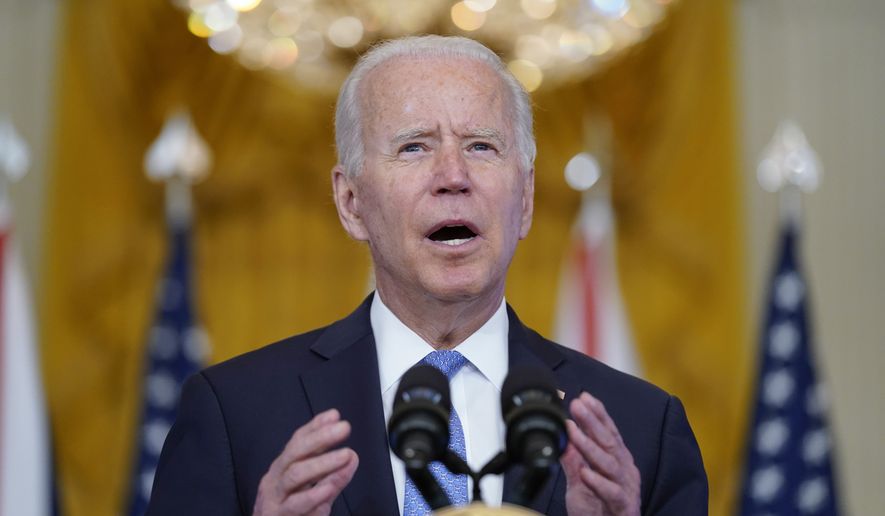President Biden’s plan for higher taxes on corporations and the wealthy to pay for his $3.5 trillion social welfare expansion so far includes 40 new taxes.
The menu of hikes ranges from doubling the federal tobacco tax to more than $2 per pack to boosting the top income tax rate to 39.6% from 37%, adding up to one of the largest tax increases in U.S. history.
Mr. Biden said Thursday that he’s ready to do more. To justify the taxing spree, he said the wealthiest Americans and biggest corporations skirt their duties to pay for government safety net programs.
“Big corporations and the superwealthy have to pay their fair share of taxes,” Mr. Biden said at the White House. “It’s long overdue.”
The 40 proposed tax hikes assembled this week by House Democrats would boost federal revenue by $2 trillion over the next decade.
The windfall would help offset the cost of the $3.5 trillion package that includes amnesty for illegal immigrants, tuition-free community college, expanded health care and climate change initiatives.
SEE ALSO: ‘Doormats’ for Pelosi: Vulnerable Democrats under fire over proposed tax hikes
The proposed taxes fall heavily on business, including limits to small-business tax deductions, an increase in the corporate tax rate to 26.5% from 21%, and a 3.8% tax on pass-through entities such as law firms.
“All of these measures are grounded in the goal of growing our economy and making it more inclusive and sustainable for the future,” said Rep. Richard E. Neal, a Massachusetts Democrat who chairs the tax-writing Ways and Means Committee.
Critics say the higher taxes on businesses will make the U.S. less competitive globally.
The increase to the corporate tax would put the U.S. rate well above those of other nations, including Scandinavian welfare states like Sweden, which taxes corporations at 20.6%. It would also be above the corporate rate of geopolitical competitors like China.
“Twenty-six and a half percent takes us to worse than China’s. It’s one of the worst in the world. They are going to eat our lunch,” said Rep. Kevin Brady of Texas, the top Republican on the Ways and Means Committee.
Democrats also proposed to hike the minimum tax on corporate profits derived from foreign investment from 10.5% to 16.6%. That change and gutting of business deductions and tax credits, Democrats say, will raise more than $963 billion over the next decade.
SEE ALSO: Liberal groups prod Dems to raise taxes to pay for racial justice agenda
Business groups said that the hikes are more than triple the $330 billion tax cut the private sector received in 2017 in President Trump’s signature tax overhaul.
“Rolling back job-creating tax reforms will slam the brakes on hiring and wage increases,” said Neil Bradley, the chief policy officer for the U.S. Chamber of Commerce. “This is an everything but the kitchen sink bill that includes every policy idea the majority has been unable to pass.”
The Democrats’ plan also raises taxes on small businesses despite Mr. Biden’s promises not to do so. Critics said the tax plan fails to distinguish between large corporations and small, family-owned businesses.
The Ways and Means proposal would limit small business tax breaks, like the 20% deduction on “qualified business income.” The deduction is available to all entrepreneurs that incorporate their small businesses as pass-through entities.
Democrats also proposed a 3.8% tax on pass-through entities, which allows individuals to claim income generated from a small business as personal income rather than corporate profit for tax purposes.
Mr. Brady said the changes will raise the tax burden on small-business owners at a time when they are struggling to recover from the COVID-19 pandemic.
He said the higher taxes will fuel inflation even further and raise taxes on the middle class, breaking Mr. Biden’s pledge to spare Americans making less than $400,000 from the tax hikes.
Democrats dismiss such rhetoric, arguing that the wealthy and big corporations have long profited from an unfair tax code.
Apart from corporate and business taxes, the proposal championed by House Democrats would raise taxes on investment income, cryptocurrencies and vaping products.
Mr. Neal’s committee also offered an increase in the capital gains tax from 20% to 25% and an increase in the top income tax rate to a pre-Trump era high of 39.6%.
Democrats also pushed forward a wealth tax in the form of a 3% surcharge on individuals with income above $5 million.
“We are taking a significant step toward leveling the playing field,” said Mr. Neal.
While those hikes are targeted at the wealthy, the higher tobacco taxes and new taxes on vaping products would hit lower-income Americans. Studies show that 72% of smokers are low-income earners.
Democrats plan to pass the tax increases within Mr. Biden’s $3.5 trillion social welfare package.
Given that universal Republican opposition is assured, Democratic leaders are relying on a special procedure called budget reconciliation to force the measure through the Senate on a party-line vote.
Unity is already proving elusive, however. House Democrats this week were forced to ditch a planned increase in inheritance tax known as step-up in basis. It would have raised assessed values of inherited property and businesses, resulting in higher tax bills for heirs.
• Jeff Mordock contributed to this report.
• Haris Alic can be reached at halic@washingtontimes.com.




Please read our comment policy before commenting.